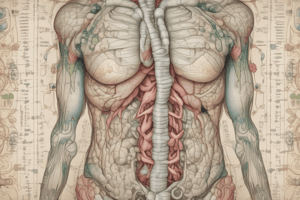Podcast
Questions and Answers
What is the primary function of hormones?
What is the primary function of hormones?
- To regulate important bodily functions (correct)
- To facilitate communication between cells
- To provide energy to the body
- To control the aging process
Which of the following is NOT a type of hormone mentioned in the passage?
Which of the following is NOT a type of hormone mentioned in the passage?
- Endocrine hormones
- Exocrine hormones (correct)
- Neurotransmitters
- Paracrine hormones
Which of the following is an example of an endocrine hormone?
Which of the following is an example of an endocrine hormone?
- Dopamine
- Serotonin
- Acetylcholine
- Insulin (correct)
How do hormones travel to their target cells?
How do hormones travel to their target cells?
What is the purpose of the hypothalamic-pituitary-gonadal axis mentioned in the passage?
What is the purpose of the hypothalamic-pituitary-gonadal axis mentioned in the passage?
What is the relationship between insulin and glucagon?
What is the relationship between insulin and glucagon?
What is the role of growth hormone?
What is the role of growth hormone?
Which hormone is crucial for female puberty and bone health?
Which hormone is crucial for female puberty and bone health?
What symptoms may result from hypothyroidism?
What symptoms may result from hypothyroidism?
Which disorder involves hormonal imbalances and potential fertility issues?
Which disorder involves hormonal imbalances and potential fertility issues?
What is the function of cortisol in the body?
What is the function of cortisol in the body?
How do hormones influence metabolic activities?
How do hormones influence metabolic activities?
Flashcards are hidden until you start studying
Study Notes
Hormones are chemical messengers produced by glands throughout the body. They regulate many important functions, including growth, development, metabolism, and sexual function. Here's what you need to know about hormones:
Overview of Hormones
Hormones are released from glands into the bloodstream, where they travel to target cells to carry out specific functions. There are several types of hormones, each with different roles and effects on the body:
-
Endocrine hormones: These are the most common type of hormone, produced by endocrine glands such as the thyroid, pancreas, pituitary gland, ovaries, testes, and others. Examples include insulin, estrogen, and testosterone.
-
Neurotransmitters: These are signaling molecules that transmit signals between neurons in the nervous system. They act as both hormones and neurotransmitters in some contexts. Examples include dopamine, serotonin, and noradrenaline.
-
Paracrine hormones: These hormones are released directly into the spaces surrounding cells and act on neighboring cells.
Interactions of Hormone Systems
Hormone systems interact with each other through several mechanisms:
-
Feedback loops: The hypothalamic-pituitary-gonadal axis provides an example of how feedback loops can regulate hormone production and release.
-
Interplay between multiple hormones: Different hormones may interact to control the same process, such as insulin and glucagon controlling blood sugar levels.
Functions of Hormones
Hormones play crucial roles in various physiological processes, including:
Growth and Development
Hormones support growth and development throughout life. For instance, growth hormone stimulates cell division and tissue repair, while thyroid hormones influence height and overall body composition.
Metabolism
Hormones regulate metabolic activities like energy storage, breakdown, and utilization. For example, cortisol helps maintain blood glucose levels during periods without eating, while insulin regulates blood sugar levels following meals.
Sexual Function
Reproductive hormones like estrogen and testosterone contribute to sexual function and reproductive health. Estrogen plays a key role in female puberty, menstruation, pregnancy, and bone health, while testosterone influences male secondary sex characteristics and fertility.
Disorders Related to Hormones
Imbalances in hormone production and regulation can lead to various disorders:
Hyperthyroidism
Excessive thyroid hormone levels can cause rapid heart rate, weight loss, anxiety, and more.
Hypothyroidism
Low thyroid hormone levels can result in fatigue, cold intolerance, and depression.
Diabetes
Imbalanced insulin levels can cause diabetes, which requires careful management to avoid complications such as nerve damage and kidney disease.
Polycystic ovary syndrome (PCOS)
This condition involves hormonal imbalances leading to irregular periods, cysts on the ovaries, and potential fertility issues.
Conclusion
Hormones are essential for a wide range of physiological processes, and their imbalances can lead to various disorders. Understanding these mechanisms is crucial in managing health and treating hormonal disorders.
Studying That Suits You
Use AI to generate personalized quizzes and flashcards to suit your learning preferences.




